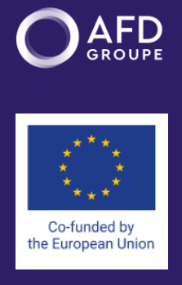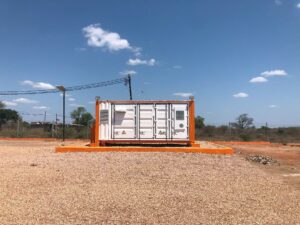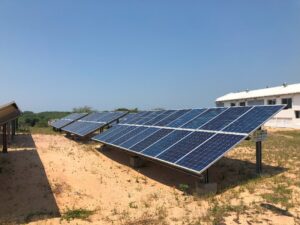Digital Energy Challenge: Digital tool for the intelligent design and operation of mini-grids in Mozambique 2022
Beneficiary: FUNAE Mozambique
Location: Mozambique
Brief description of the project:
The Digital Energy Challenge (DEC) for utilities is a programme implemented by Agence Française de Développement with the support of the European Union, working to develop innovative digital solutions for a fair energy transition. The programme targets projects involving an African utility company in partnership with an innovative technology/service provider. The project submitted by Azimut 360 is the development of a digital tool for the monitoring and management of rural mini-grids in Mozambique. This solution allows data collection, remote monitoring of operations and facilitates the maintenance of the mini-grids. It is currently being implemented by Azimut 360 and the Fundo de Energia (FUNAE) of Mozambique, with the support of several technical partners.
Performed tasks:
- Installation of monitoring and data acquisition equipment
- Development of a digital tool for the smart operation and management of mini-grids
- Centralised monitoring of mini-grids
General Objective:
Develop and implement a digital tool to facilitate FUNAE’s planning, monitoring and efficient management of rural mini-grids in Mozambique, in order to accelerate off-grid electrification and contribute to universal energy access by 2030.
Added Value:
 This project contributes to the digitalisation and optimisisation the planning, operation and monitoring of rural mini-grids in Mozambique through the development of the digital tool. This facilitates FUNAE’s efficient data collection for technical design, with geographic, socio-economic databases and self-learning capabilities. In addition, it enables centralised, real-time monitoring of mini-grids, eliminating the need for frequent field visits. It also incorporates intelligent operation and maintenance functions, with automatic recommendations to expand capacity or adjust parameters, which improves system efficiency and encourages the participation of private operators. Overall, the project reinforces sustainability, standardises processes and strengthens FUNAE’s capacity to lead rural electrification towards the goal of universal energy access by 2030.
This project contributes to the digitalisation and optimisisation the planning, operation and monitoring of rural mini-grids in Mozambique through the development of the digital tool. This facilitates FUNAE’s efficient data collection for technical design, with geographic, socio-economic databases and self-learning capabilities. In addition, it enables centralised, real-time monitoring of mini-grids, eliminating the need for frequent field visits. It also incorporates intelligent operation and maintenance functions, with automatic recommendations to expand capacity or adjust parameters, which improves system efficiency and encourages the participation of private operators. Overall, the project reinforces sustainability, standardises processes and strengthens FUNAE’s capacity to lead rural electrification towards the goal of universal energy access by 2030.
Solar Electrification of Rural Mozambique: The Challenge of the Future
Mozambique has set a target of achieving universal energy access by 2030. However, projections show that less than 60% of the population will be connected to the grid by that date. In this context, the project aims to accelerate the electrification of the country, especially in rural areas, where 70% of the population resides and only 7% has access to electricity. To achieve this goal, it is essential to implement sustainable and efficient solutions.
The necessity of the project: electrification and training
FUNAE – the agency responsible for rural electrification in Mozambique – faces significant barriers to making progress in implementing mini-grids, and achieving the electrification targets set by the government. Currently, field data collection is slow and costly, monitoring of installations requires frequent travel, and operational management relies on third parties with limited capacities. In addition, the lack of centralised tools hinders decision-making and accountability. The proposed digital solution overcomes these obstacles, facilitating a more integrated, agile and sustainable approach to expanding energy access in rural areas.
Proposed Solution and Project Objectives
 For this challenge, the solution consists of the development and implementation of an innovative digital tool that allows FUNAE to optimise the entire lifecycle of mini-grid projects: from data collection for the initial design to monitoring and operational management once in operation. This platform integrates geographical and socio-economic databases, facilitates remote monitoring of installations and provides intelligent recommendations to improve system performance. The aim of the project is to accelerate rural electrification in Mozambique through more efficient, standardised and sustainable management, thus contributing to meeting the goal of universal energy access by 2030.
For this challenge, the solution consists of the development and implementation of an innovative digital tool that allows FUNAE to optimise the entire lifecycle of mini-grid projects: from data collection for the initial design to monitoring and operational management once in operation. This platform integrates geographical and socio-economic databases, facilitates remote monitoring of installations and provides intelligent recommendations to improve system performance. The aim of the project is to accelerate rural electrification in Mozambique through more efficient, standardised and sustainable management, thus contributing to meeting the goal of universal energy access by 2030.
Undertaken Activity: Implementation and pilot
Within the framework of the project, the action focuses on the development and implementation of the digital tool, accompanied by a pilot with thirteen mini-grids in operation, selected by FUNAE. These mini-grids have been integrated into the platform to validate their operation in a real environment. The pilot includes the installation of monitoring devices where the integration of existing data is necessary and the training of FUNAE technical staff to ensure the autonomous use of the tool. This phase allows adjusting and improving the solution based on practical experience and preparing its future extension to more systems.
Value of the Project
This project enables FUNAE to transform the way it plans, implements and supervises the country’s rural mini-grids. The integration of digital tools optimises data collection, technical design, remote monitoring and operational management. In addition, it reduces reliance on costly manual processes and improves overall system efficiency, facilitating the participation of private operators, standardising processes and reinforcing the sustainability of the rural electrification model. This solution not only accelerates the pace of new connections, but also improves the quality and reliability of energy access, making a decisive contribution to the goal of universal access by 2030.